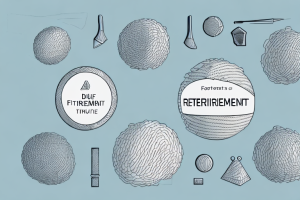Retirement is a significant milestone in life that requires careful planning and consideration. One of the most important factors to consider is the amount of money needed to sustain a comfortable retirement lifestyle. In this article, we will delve into the question of whether $300,000 is a good amount for retirement and explore various aspects related to this topic.
Understanding the importance of saving for retirement
Before we delve into the adequacy of a $300,000 retirement fund, it is crucial to understand the importance of saving for retirement in the first place. Retirement is a time when most individuals no longer earn a regular income from employment. Hence, having sufficient savings is essential to meet living expenses and maintain a comfortable lifestyle during these years.
By starting early and consistently setting aside funds for retirement, you can leverage the power of compounding and give your savings more time to grow. This approach allows you to accumulate a more substantial nest egg, providing greater financial security and flexibility in retirement.
One key aspect to consider when saving for retirement is the potential impact of inflation. Over time, the cost of living tends to increase due to inflationary pressures. Therefore, it is important to factor in the effects of inflation when determining how much to save for retirement. By accounting for inflation, you can ensure that your savings will be able to maintain their purchasing power and cover your expenses throughout your retirement years.
Another factor to keep in mind is the potential need for long-term care in retirement. As individuals age, there is a higher likelihood of requiring assistance with daily activities or medical care. Long-term care can be costly, and it is important to plan for these potential expenses when saving for retirement. Considering options such as long-term care insurance or setting aside additional funds specifically for this purpose can help provide financial security and peace of mind in retirement.
Evaluating the adequacy of a $300,000 retirement fund
Now let’s turn our attention to the central question: Is $300,000 a good amount for retirement? The answer depends on various factors, including your desired standard of living, expected retirement duration, and potential sources of supplemental income.
While $300,000 may seem like a significant sum, it might not be sufficient to sustain a comfortable retirement lifestyle for an extended period, especially if you plan to retire early or have significant expenses. However, it could be a reasonable amount to complement other sources of retirement income, such as Social Security, pensions, or rental properties.
Factors to consider when determining retirement savings goals
When determining your retirement savings goals, several key factors should be taken into account:
- Your anticipated retirement age
- Your desired annual income during retirement
- Your estimated life expectancy
- Your expected returns on investments
- Inflation and the rising cost of living
Considering these factors will help you determine a more accurate estimate of the amount of money you will need to retire comfortably.
How does $300,000 compare to average retirement savings?
It’s essential to compare your $300,000 retirement fund to average retirement savings to gain a broader perspective. According to various studies, the average retirement savings among Americans falls far short of what financial experts recommend.
For instance, a survey conducted by the Economic Policy Institute found that the median retirement savings for households approaching retirement age (ages 56-61) is only $21,000. In comparison, $300,000 represents a much more substantial nest egg.
Analyzing the potential longevity of a $300,000 retirement fund
Another critical aspect to consider is the potential longevity of a $300,000 retirement fund. Withdrawing a fixed amount each year from this fund, commonly known as the “4% rule,” assumes that the savings will last for approximately 30 years.
However, individual circumstances differ, and factors such as market performance, inflation, and unexpected expenses can impact the fund’s longevity. To ensure a secure retirement, it’s advisable to regularly review your financial situation and adjust your withdrawal strategy accordingly.
Exploring the impact of inflation on retirement savings
Inflation is an often overlooked but significant factor that can erode the purchasing power of your retirement savings over time. As prices rise, the same amount of money will buy you less in the future. Therefore, it is crucial to consider the impact of inflation when evaluating the adequacy of $300,000 for retirement.
Investing in vehicles that offer potential growth above the inflation rate, such as stocks, can help mitigate the corrosive effects of inflation and preserve the purchasing power of your savings.
Strategies for maximizing a $300,000 retirement fund
While $300,000 may not initially seem like a substantial retirement fund, there are strategies you can employ to maximize its potential. By adopting a proactive approach, you can make the most of your savings and create a more secure retirement future.
One effective strategy is to minimize expenses and stretch your retirement dollars. This can be achieved by carefully budgeting and identifying areas where you can cut back without sacrificing your quality of life. Additionally, exploring potential sources of supplemental income, such as part-time work or rental properties, can provide an extra financial cushion.
The role of investment returns in building a secure retirement
Investment returns play a vital role in building a secure retirement. By allocating a portion of your $300,000 retirement fund to a well-diversified investment portfolio, you can potentially generate additional income and grow your savings over time.
It is important to note that investing in stocks, bonds, or other assets carries inherent risks. It is crucial to strike a balance between risk and reward that aligns with your risk tolerance and financial goals. Consider consulting with a financial advisor to devise an investment strategy that maximizes returns while protecting your nest egg.
Creating a comprehensive budget for retirement with $300,000
When planning for retirement, creating a comprehensive budget is essential to ensure your $300,000 can sustain your desired lifestyle. Start by determining your essential expenses, such as housing, healthcare, and groceries. Then, allocate funds for discretionary expenses, such as travel or hobbies.
Regularly reviewing and adjusting your budget can help you prioritize expenses and make necessary modifications as your circumstances evolve throughout retirement.
Tips for minimizing expenses and stretching your retirement dollars
Minimizing expenses and stretching your retirement dollars is crucial when working with a $300,000 retirement fund. Here are a few tips to help you achieve this:
- Downsize your living arrangements if your current home is too large or costly.
- Take advantage of senior discounts and other cost-saving programs.
- Consider relocating to an area with a lower cost of living.
- Prioritize your spending and focus on experiences that bring you true joy and fulfillment.
By making conscious choices and being mindful of your expenditures, you can make your retirement funds go further.
Assessing potential sources of supplemental income during retirement
In addition to your $300,000 retirement fund, exploring potential sources of supplemental income can provide additional financial security during retirement. Consider options such as part-time work, starting a small business, or rental income from properties you own.
Supplemental income can help offset any unexpected expenses or provide extra financial flexibility to enhance your retirement lifestyle.
Diversifying your investment portfolio to safeguard your $300,000 nest egg
An essential aspect of protecting your $300,000 nest egg is diversifying your investment portfolio. Spreading your investments across various asset classes, such as stocks, bonds, and real estate, can help mitigate risk and potentially enhance returns.
Consulting with a financial advisor can provide valuable insights into building a well-diversified portfolio that aligns with your risk tolerance and financial goals.
The importance of ongoing financial planning in retirement with $300,000
Financial planning doesn’t end once you retire. It is essential to continue monitoring and adjusting your financial strategy to ensure your $300,000 retirement fund remains on track.
Factors such as changing market conditions, evolving tax laws, and personal circumstances may require adjustments to your investment approach, spending habits, and estate planning. Regularly reviewing your financial situation with the help of a financial advisor can provide peace of mind and help you address potential challenges proactively.
Considering healthcare costs and long-term care expenses in your retirement budget
Healthcare costs, including medical insurance premiums, prescription medications, and potential long-term care expenses, are crucial considerations in your retirement budget.
It is advisable to factor in the rising costs of healthcare and explore options for long-term care insurance or other strategies to protect yourself against potentially significant medical expenses during retirement.
Exploring different withdrawal strategies to make $300,000 last throughout retirement
Making $300,000 last throughout retirement requires careful withdrawal planning. Different strategies can be employed to ensure your savings are distributed in a sustainable manner over the course of your retirement.
One common approach is to follow the “4% rule,” which involves withdrawing 4% of your initial retirement savings annually, adjusted for inflation. However, depending on your circumstances, an alternative strategy, such as the “bucket approach,” might be more appropriate. Consulting with a financial advisor can help you determine the best withdrawal strategy for your specific needs.
Balancing risk and reward when investing with a $300,000 nest egg
Investing with a $300,000 nest egg requires careful consideration of risk and reward. While taking on more risk may offer the potential for higher returns, it can also expose your savings to greater volatility.
It is crucial to strike a balance that aligns with your risk tolerance and financial goals. A diversified investment portfolio tailored to your specific needs can help manage risk and optimize returns while safeguarding your $300,000 nest egg.
Evaluating the potential impact of unforeseen circumstances on a $300,000 retirement fund
Unforeseen circumstances, such as sudden health issues or economic downturns, can significantly impact a $300,000 retirement fund. It is crucial to evaluate potential risks and have contingency plans in place.
Consider building an emergency fund and exploring insurance options to protect against unexpected events. Regularly reviewing and adjusting your financial plan can help adapt to changing circumstances and mitigate potential hardships.
Understanding the tax implications of different withdrawal strategies with $300,000
Withdrawal strategies have different tax implications that can impact the longevity and value of your $300,000 retirement fund. It is crucial to understand the tax rules and seek professional guidance to optimize your withdrawals and minimize unnecessary tax liabilities.
Consulting with a tax professional or financial advisor experienced in retirement planning can help you navigate the complex tax landscape and make the most of your $300,000 nest egg.
Seeking professional advice: When should you consult a financial advisor about your $300,000 nest egg?
While this article provides a comprehensive overview of various considerations related to a $300,000 retirement fund, seeking professional advice is always recommended when it comes to your financial future.
Consulting with a qualified financial advisor can provide personalized guidance based on your unique circumstances and goals. They can help you develop a robust retirement plan, optimize your investments, and ensure that you are on track to achieve a secure and fulfilling retirement with your $300,000 nest egg.
In conclusion, while $300,000 can provide a foundation for retirement, its adequacy ultimately depends on individual circumstances, goals, and lifestyle choices. By considering various factors, employing smart financial strategies, and seeking professional advice, you can make the most of your $300,000 retirement fund and work towards a stable and enjoyable retirement.



